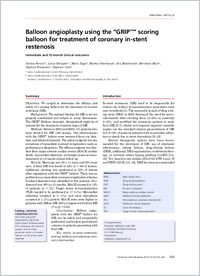Balloon angioplasty using the "grip" scoring balloon for treatment of coronary in-stent restenosis - immediate and 12-month clinical outcomes
- Puricel, Serban Swiss Cardiovascular Center Fribourg, Switzerland
- Schoepke, Linus Swiss Cardiovascular Center Bern, Switzerland
- Togni, Mario Swiss Cardiovascular Center Fribourg, Switzerland
- Oberhänsli, Markus Swiss Cardiovascular Center Fribourg, Switzerland
- Moschovitis, Aris Swiss Cardiovascular Center Bern, Switzerland
- Meier, Bernhard Swiss Cardiovascular Center Bern, Switzerland
- Windecker, Stephan Swiss Cardiovascular Center Bern, Switzerland
- Cook, Stéphane Swiss Cardiovascular Center Fribourg, Switzerland
-
2012
Published in:
- Cardiovascular Medicine. - 2012, vol. 15, no. 12, p. 354–361
English
Objectives: We sought to determine the efficacy and safety of a scoring balloon for the treatment of in-stent restenosis (ISR). Background: The optimal therapy for ISR is not yet properly established and subject to many discussions. The GRIP™ Balloon (Acrostak, Switzerland) might be of interest for the treatment of certain types of ISR. Methods: Between 2003 and 2009, 157 patients who were treated for ISR (182 lesions, 164 interventions) with the GRIP™ balloon were retrieved from our database and followed clinically. The safety endpoint was the occurrence of immediate coronary complication (such as perforation or dissection). The efficacy endpoint was freedom from major adverse cardiac events (MACE: cardiac death, myocardial infarction, and target lesion revascularisation) at 12-month clinical follow-up. Results: Mean age was 65 ± 11 years and 82% were men. A focal ISR was found in 54% (n = 93) of lesions. Additional stenting was performed in 22% of lesions after angioplasty with the GRIP™ balloon. There was no perforation as immediate coronary complication whereas localised dissection was identified in five patients (3%). Survival was 98% at 12 months. MACE occurred in 13% of patients (n = 21). Target lesion revascularisation (TLR) needed to be performed in 17 (11%). Myocardial infarction occurred in 2 (1%), and stent thrombosis occurred in 1 (1%) patient. MACE rates were higher in patients with diffuse ISR (20%) compared with focal ISR (7%) (p = 0.02). Conclusions: Balloon angioplasty with the GRIP™ balloon for ISR can be safely and successfully performed, and leads to good clinical outcome in patients presenting with focal ISR.
- Faculty
- Faculté des sciences et de médecine
- Department
- Médecine 3ème année
- Language
-
- English
- Classification
- Medicine
- License
- License undefined
- Identifiers
-
- RERO DOC 31189
- DOI 10.4414/cvm.2012.00128
- Persistent URL
- https://folia.unifr.ch/unifr/documents/302906
Statistics
Document views: 203
File downloads:
- coo_bau.pdf: 268
